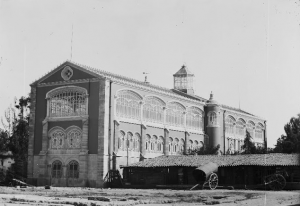 The European palaces established more than mere residences of monarchs, princes, cardinals, aristocrats and bourgeois. They were centers of power, solid social and political symbols, and also production centers for culture, arts and science. On the other hand, they played a fundamental role by motivating the renovation and expansion of cities. In a broad sense, we can consider the palace as a center that marked not only the inner spaces, but also its surroundings. Starting from this premise and taking the opportunity of the celebrations of the 500th anniversary of the construction of the so called Palácio de D. Manuel in Évora, this is the ideal context for organizing this international conference.
The European palaces established more than mere residences of monarchs, princes, cardinals, aristocrats and bourgeois. They were centers of power, solid social and political symbols, and also production centers for culture, arts and science. On the other hand, they played a fundamental role by motivating the renovation and expansion of cities. In a broad sense, we can consider the palace as a center that marked not only the inner spaces, but also its surroundings. Starting from this premise and taking the opportunity of the celebrations of the 500th anniversary of the construction of the so called Palácio de D. Manuel in Évora, this is the ideal context for organizing this international conference.
The European palaces established more than mere residences of monarchs, princes, cardinals, aristocrats and bourgeois. They were centers of power, solid social and political symbols, and also production centers for culture, arts and science. On the other hand, they played a fundamental role by motivating the renovation and expansion of cities. In a broad sense, we can consider the palace as a center that marked not only the inner spaces, but also its surroundings.
Starting from this premise and taking the opportunity of the celebrations of the 500th anniversary of the construction of the so called Palácio de D. Manuel in Évora, this is the ideal context for organizing an international conference entitled « Palaces and Urban Dynamics: centers of power and knowledge in Europe. »
Main themes
For this international meeting to be held in Évora, on 5, 6 and 7 November 2015, we have invited experts of a wide range of disciplines that includes the Arts, Humanities and Social Sciences. The areas that will guide the papers to be presented in this multilingual Congress
will be:
1. Palaces and polarization, the renovation and expansion of urban space;
2. The palace in architectural and artistic reading;
3. The palace, institutions and powers;
4. The courts, label and social actors;
5. Palace, culture and knowledge;
6. Palace, tourism and new heritage uses.
Location: Évora, Colégio do Espírito Santo (University of Évora)
Submission guideleines
Submission of Proposals:
until May 10, 2015
Date for notification of the outcome of submission: June 1, 2015
Send: Communication Title, abstract (700 words), affiliation, academic curriculum (300 words), 5 keywords.
Please send your proposal to: http://www.palaciomanuel.uevora.pt/
For additional and more detailed information please consult: www.palaciomanuel.uevora.pt/
Organizing Committee
– Ana Cardoso de Matos – University of Évora – CIDEHUS
– António Candeias – University of Évora – Laboratório HERCULES
– Cármen Almeida – Municipality of Évora, IHC_ CEHFCI da UE
– José Mirão – University of Évora – Laboratório HERCULES
– Maria de Fátima Nunes – University of Évora – CEHFCI
– Paulo Simões Rodrigues – University of Évora – CHAIA
Scientific committee
- Ana Cardoso de Matos – University of Évora – CIDEHUS
- Ana Luengo – IFLA Europa
- António Camões Gouveia – University Nova de Lisboa – CHAM
- António Lamas – Cultural Center of Belém
- Carlos Costa – University of Aveiro – GOVCOPP
- Fernanda Olival – University of Évora – CIDEHUS
- Joaquim Costa Leite – University of Aveiro
- José Alberto Machado – University of Évora – CHAIA
- M. Christine Boyer – Princeton University School of Architecture
- María Cátedra – Universidad Complutense de Madrid – FCPS – DAS
- Maria de Fátima Nunes – University of Évora – IHC – CEHFCI da U.E
- Marta C. Lourenço – MUNHAC – University of Lisboa – CIUHCT
- Paulo Lourenço – University of Minho
- Rafael Moreira – University Nova de Lisboa – CHAM
- Ana Isabel Buescu – University Nova de Lisboa – CHAM
- António Candeias – University of Évora – HERCULES Laboratory
- Augusto Fitas – Professor at University of Évora (retired) – IHC_ CEHFCI da U.E
- Carlos Fortuna – University of Coimbra – CES
- Irene Vaquinhas – Faculdade de Letras da University of Coimbra – CHSCU da U.C.
- José Delgado Rodrigues – LNEC (National Laboratory of Civil Engineering)
- José Mirão – University of Évora – HERCULES Laboratory
- Marcelo Ferraz – Escola da Cidade de S.Paulo
- Margaret Lopes – University of Brasília
- Maria João Baptista Neto – University of Lisboa – ARTIS
- Nuno Senos – University Nova of Lisboa – FCSH – CHAM
- Paulo Simões Rodrigues – University of Évora – CHAIA
- Vítor Serrão – University of Lisboa – ARTIS

Leave a Reply
You must be logged in to post a comment.